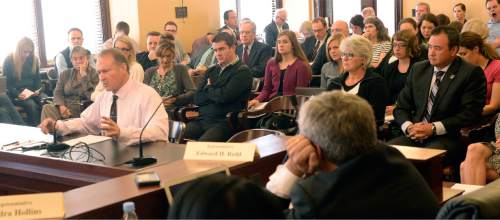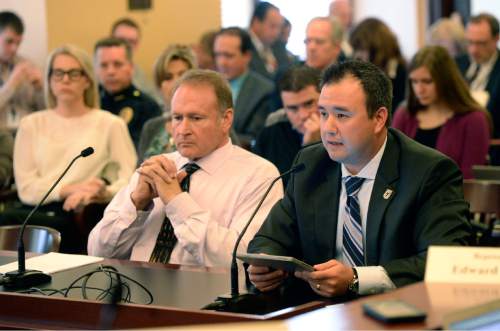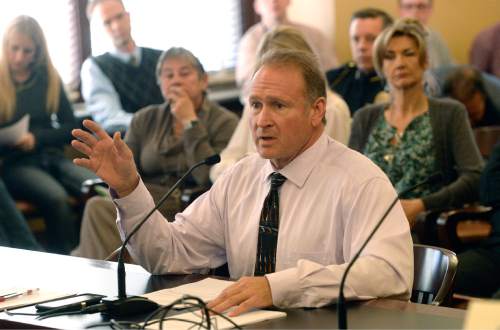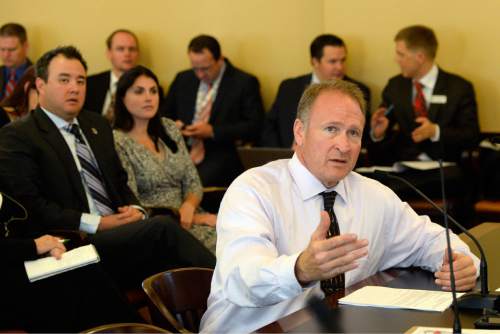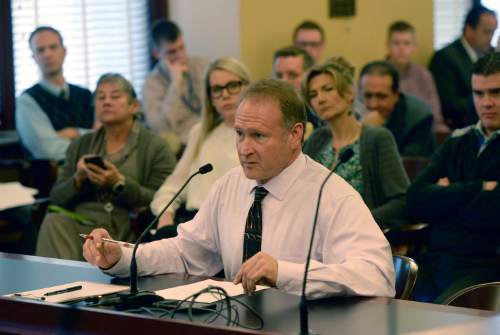This is an archived article that was published on sltrib.com in 2015, and information in the article may be outdated. It is provided only for personal research purposes and may not be reprinted.
Peter Haglin was a paratrooper during the battle for Fallujah in Iraq, and suffered such injuries as a torn ACL, a broken hip, broken feet and multiple head injuries.
But it is his and other veterans' battles with post-traumatic stress disorder (PTSD) that has Haglin pushing for Utah to allow the use of medical marijuana.
"We knew what we were getting into and we were good with it," Haglin, of Park City, told the Health and Human Services Interim Committee on Wednesday. "But none of us knew what it was going to be like to live our lives after the dust had settled on our military careers."
The committee got its first glimpse of dueling medical cannabis proposals: an ambitious one pushed by Sen. Mark Madsen, R-Saratoga Springs, and a modest plan put forth by Sen. Evan Vickers, R-Cedar City, and Rep. Brad Daw, R-Orem.
The committee didn't take a position on either proposal, but could do so at its November meeting.
"Let's not take a step we're going to regret later on," said Daw, whose bill would allow 2,000 to 5,000 Utahns access to medications with cannabidiol (CBD), a cannabis extract that does not have mind-altering effects.
Madsen said his bill, which would legalize medications containing both CBD and tetrahydrocannabinol (THC), which is responsible for marijuana users' high, could help nearly 100,000 Utahns.
That bill, still being drafted, would allow people with such conditions as cancer, chronic pain, epilepsy, Crohn's disease and multiple sclerosis to go to medical specialists for prescriptions. Primary physicians could not write such scrips.
One of the chief benefits, Madsen said, would be a reduction in overdose deaths from opioid drugs.
Only veterans would be able to get the medical cannabis for PTSD, said Madsen.
Some 22 vets commit suicide every day, Haglin said. And the existing drugs for PTSD cause weight gain and loss of sexual appetite, he said.
"There are increasing numbers of vets who find cannabis helping in relieving symptoms," he said.
Madsen said the regulatory framework in his bill will involve the Department of Agriculture licensing and regulating growers, processing plants and independent testing labs. The Department of Health would do the same for dispensaries.
Patients would be given a prescription and their doctors would enter the information into a database that law enforcement could access.
Every marijuana plant would be given a bar code, and each resulting product — oils, tinctures and edibles like candy — would retain that bar code so products would be tracked.
"Throughout this process, there is seed-to-sale monitoring," Madsen said.
The bill Daw and Vickers propose would treat cannabis like a medicine, they told the committee. Doctors would make "recommendations" that patients access cannabis at a privately owned dispensary, not write prescriptions. There would be few dispensaries in the state, and no one doctor could make more than 100 recommendations.
The state's Controlled Substance Advisory Committee, in the Department of Commerce, would recommend to the Legislature what medical conditions could be treated with CBD, and would tell doctors what information to gather from patients so researchers could track the drugs' effectiveness, Vickers said.
Michelle McOmber, chief executive of the Utah Medical Association, and Tom Ross, Bountiful's chief of police and president of the Utah Chiefs of Police Association, said they prefer the Daw-Vickers proposal.
And the committee heard a moving plea from a West Jordan mother who lost her 13-year-old son four years ago. Collin Worland was crossing a street and was struck by a driver who had been using marijuana, said Erin Worland.
Erin Worland said she supports the Daw-Vickers proposal "if you feel you must legalize it.
"My whole world at that moment had ended. I felt like my heart had been ripped out of my chest," she said.
A year ago, her 33-year-old brother in Colorado suddenly died, leaving behind a wife and two children. He had a medical permit to use cannabis for ankle pain, and to sell it from his homegrown supply. But he used the drug recreationally and was addicted, she said.
"I believe marijuana has killed two people that I loved dearly," she said. "If you do choose to legalize marijuana, more families will experience similar heartache."
Twitter: @KristenMoulton


